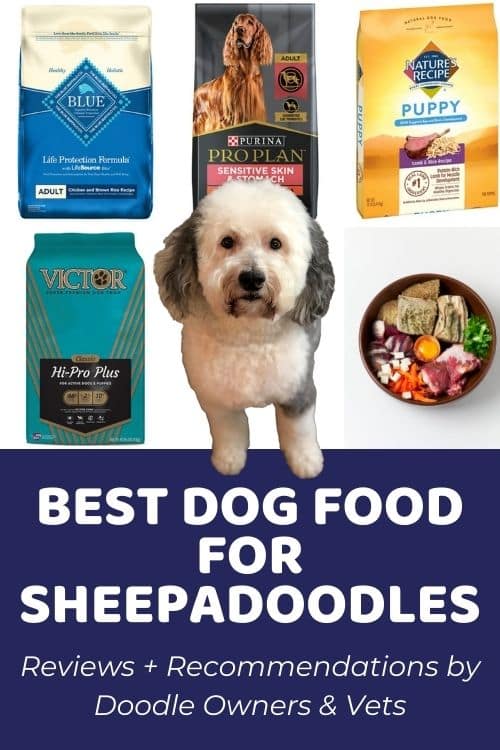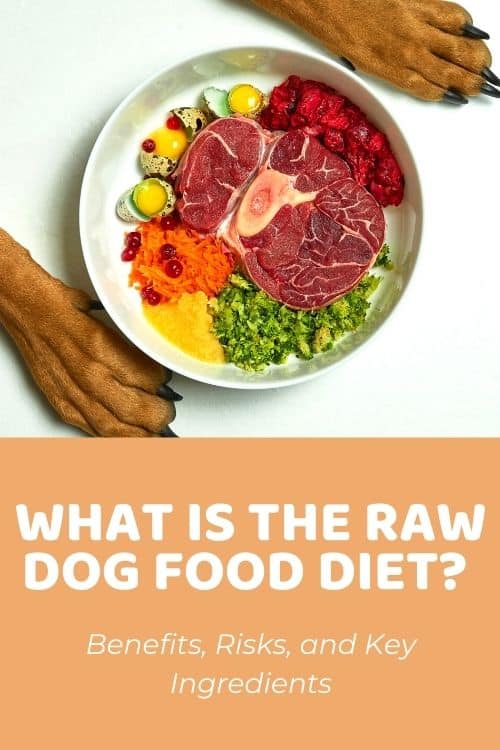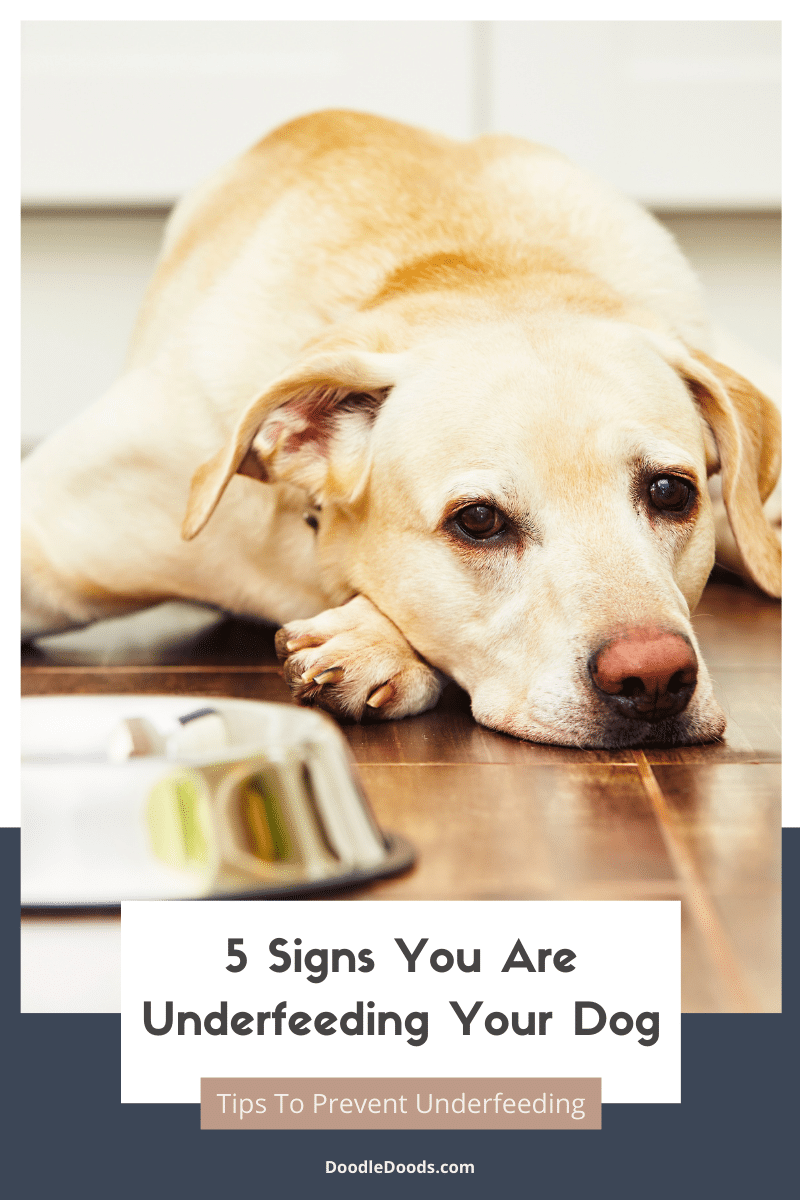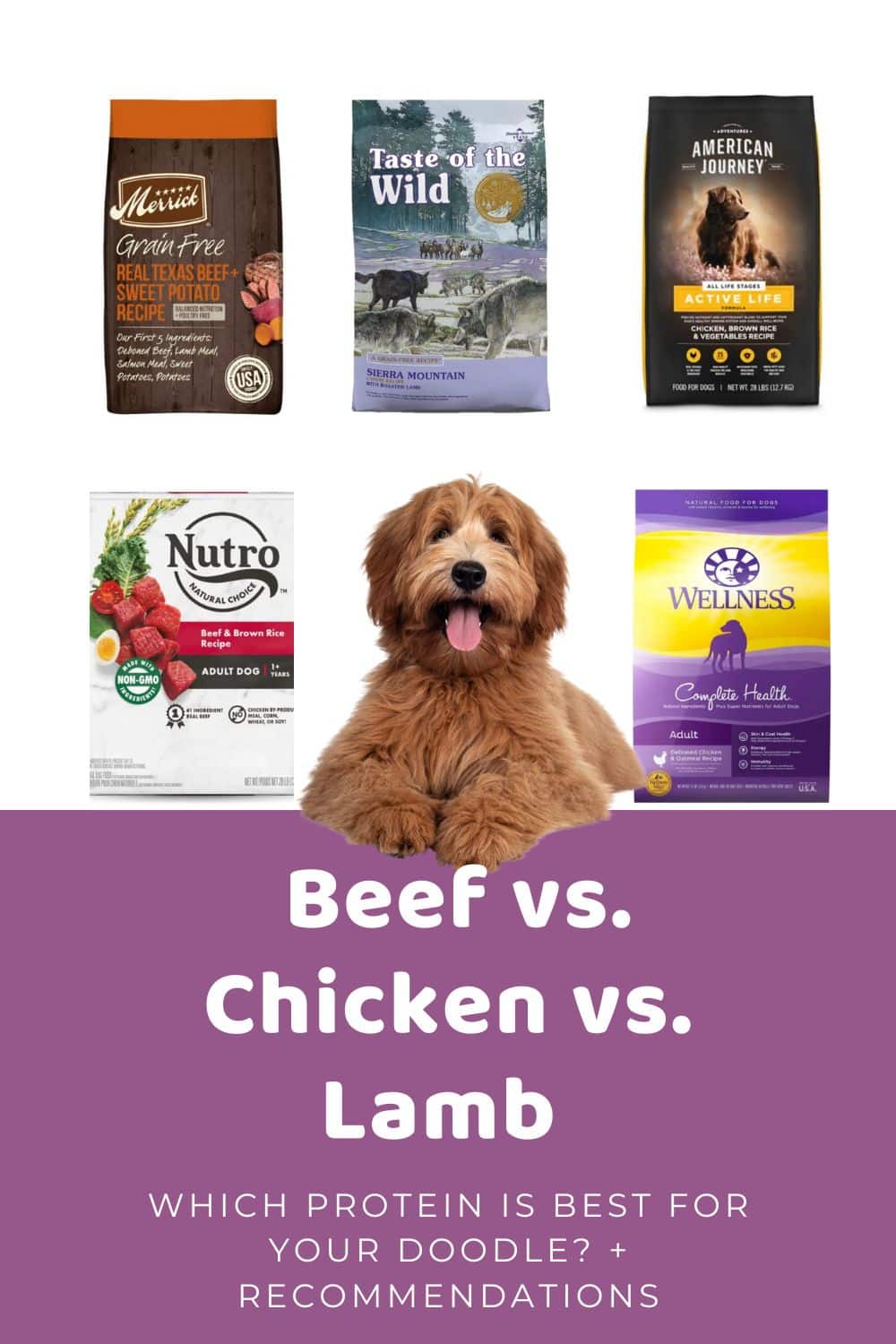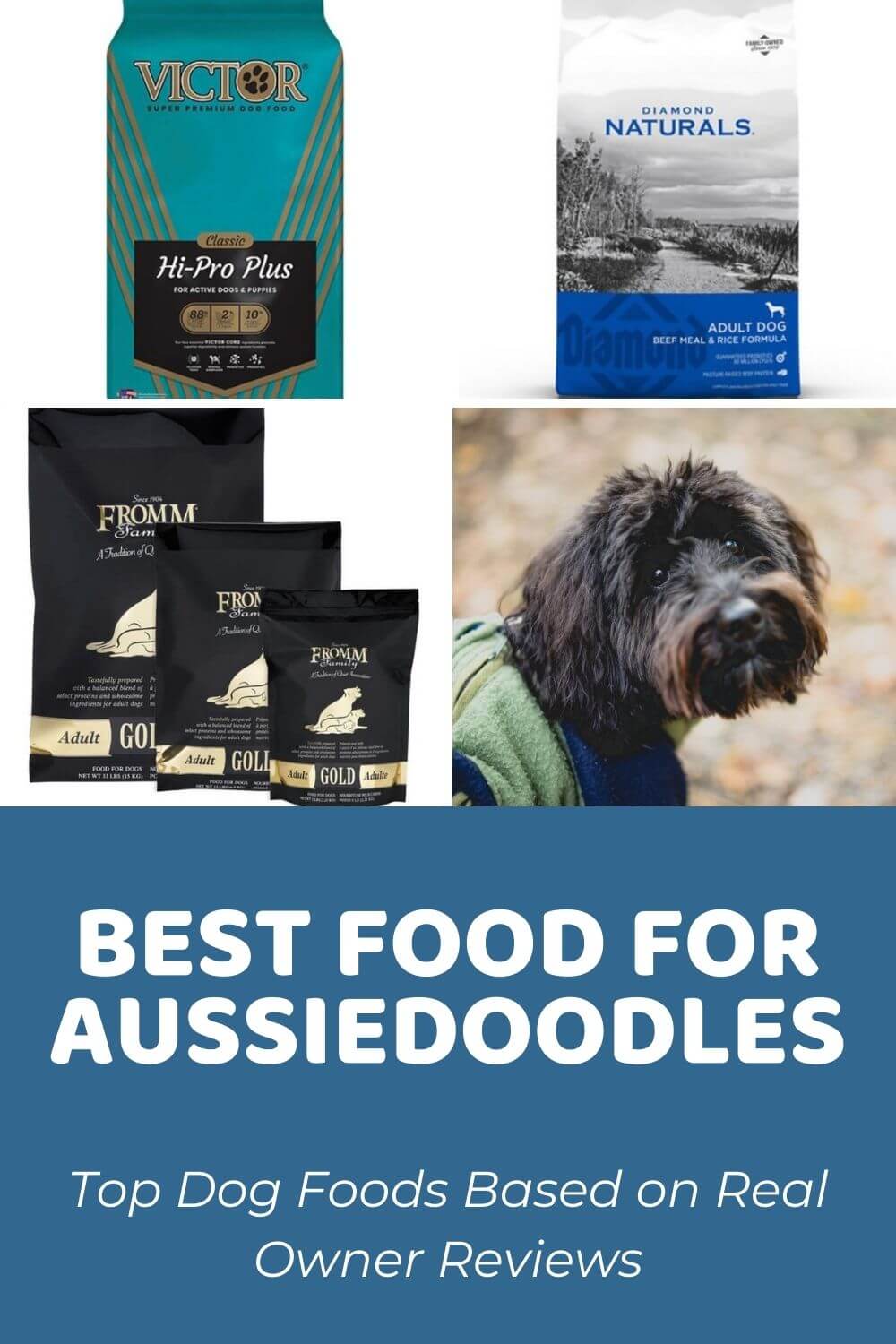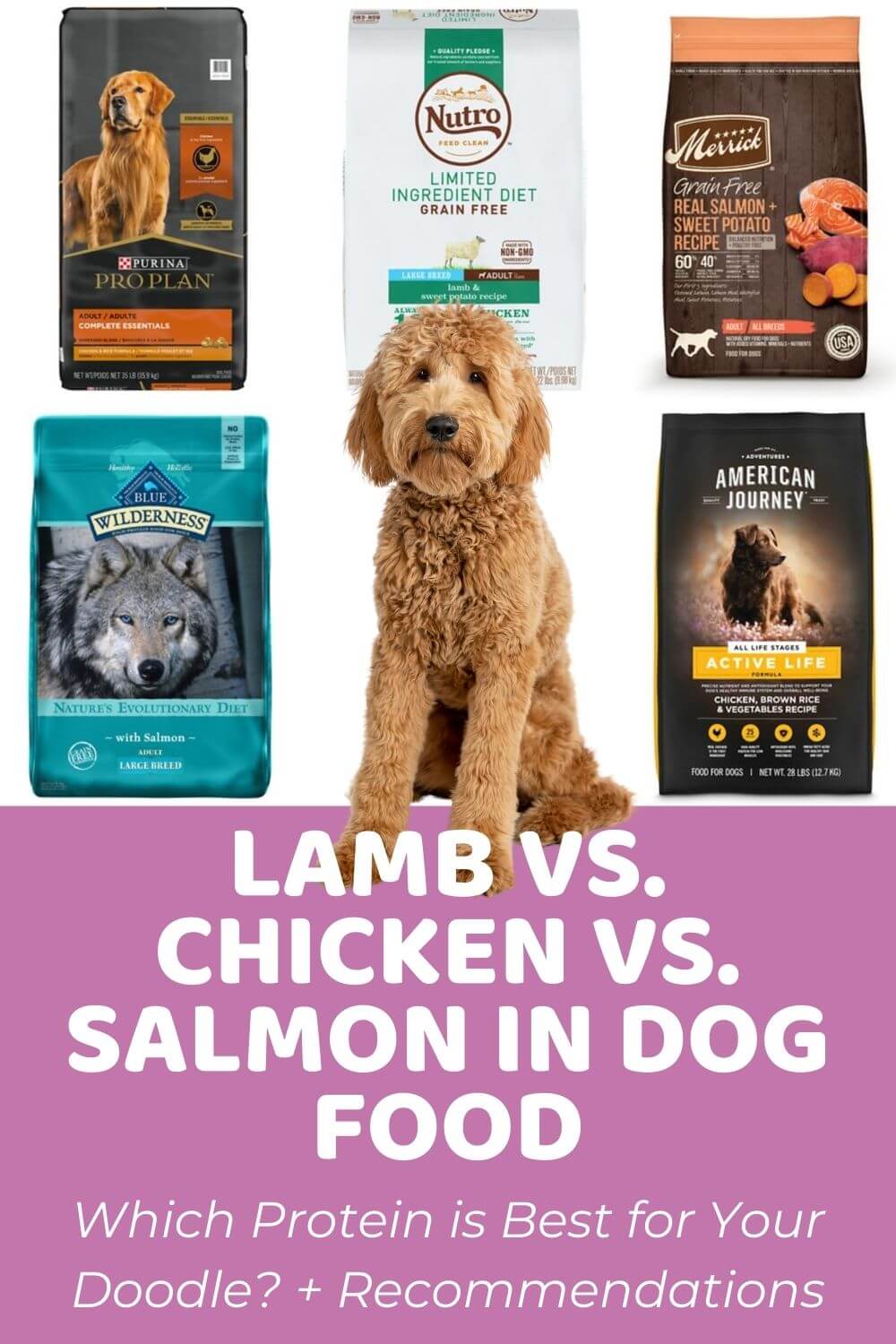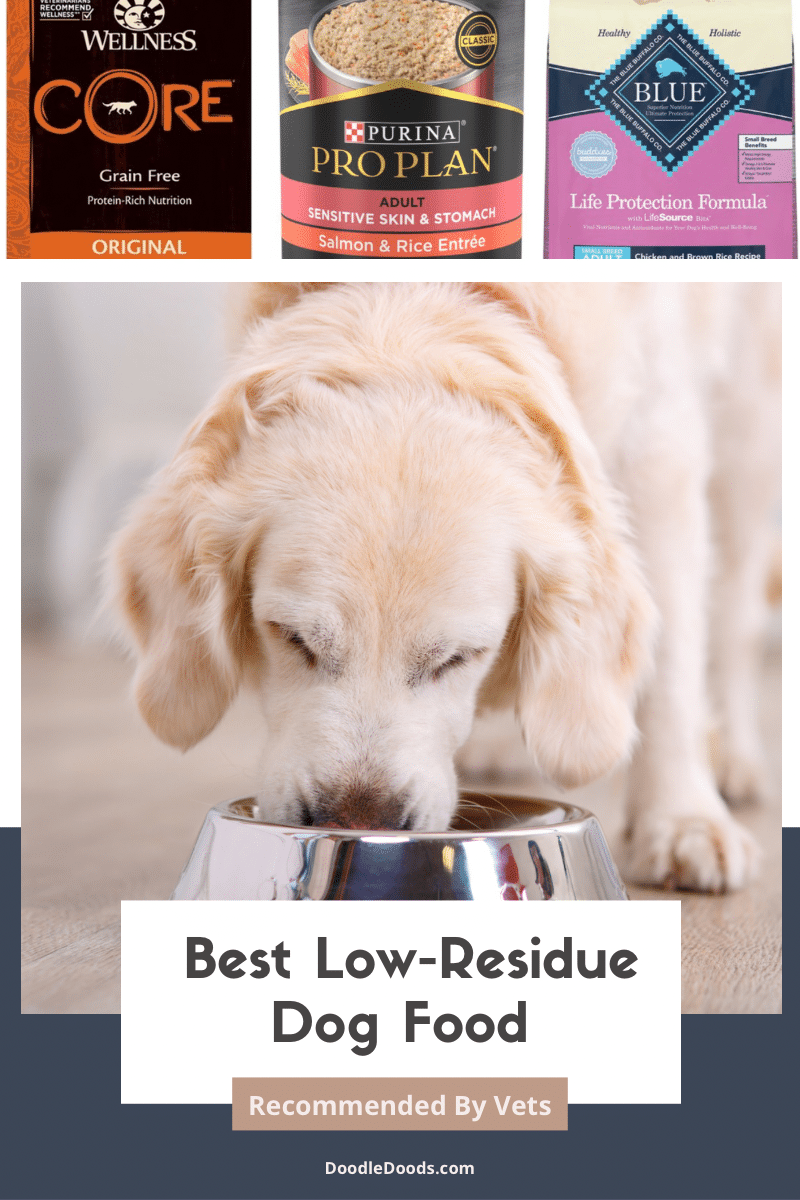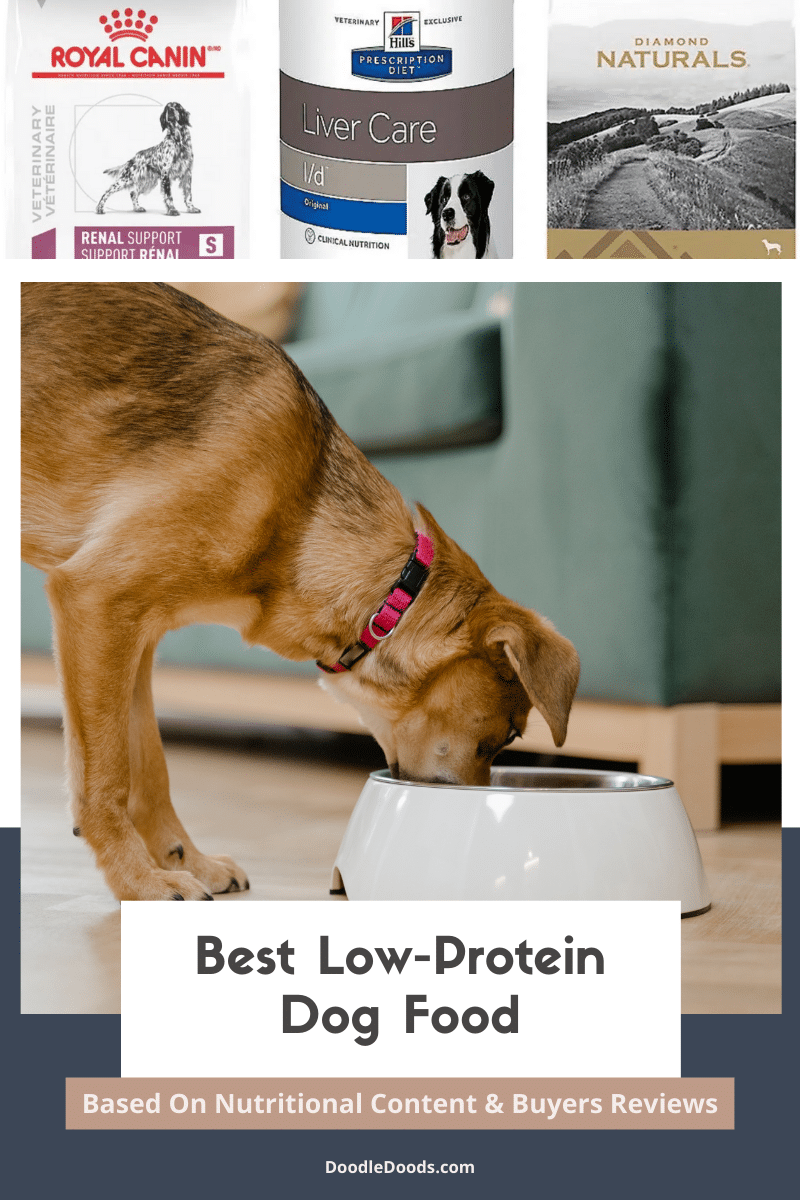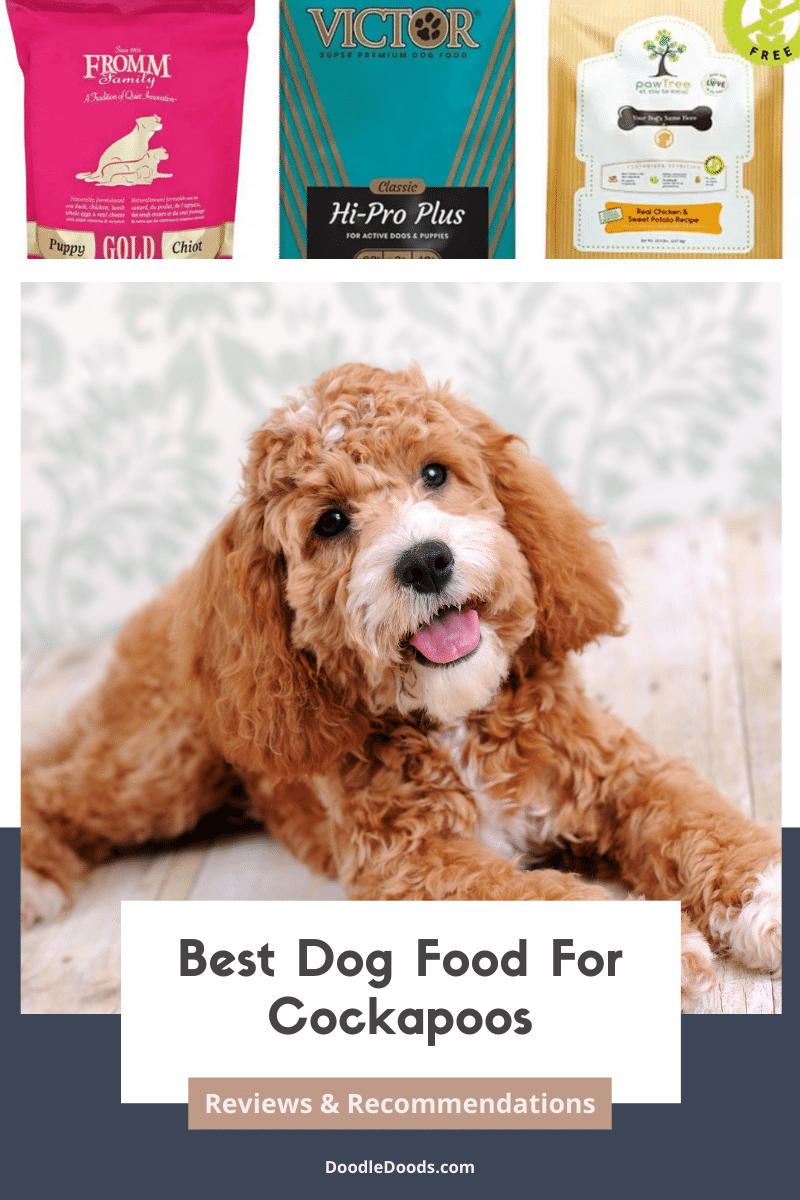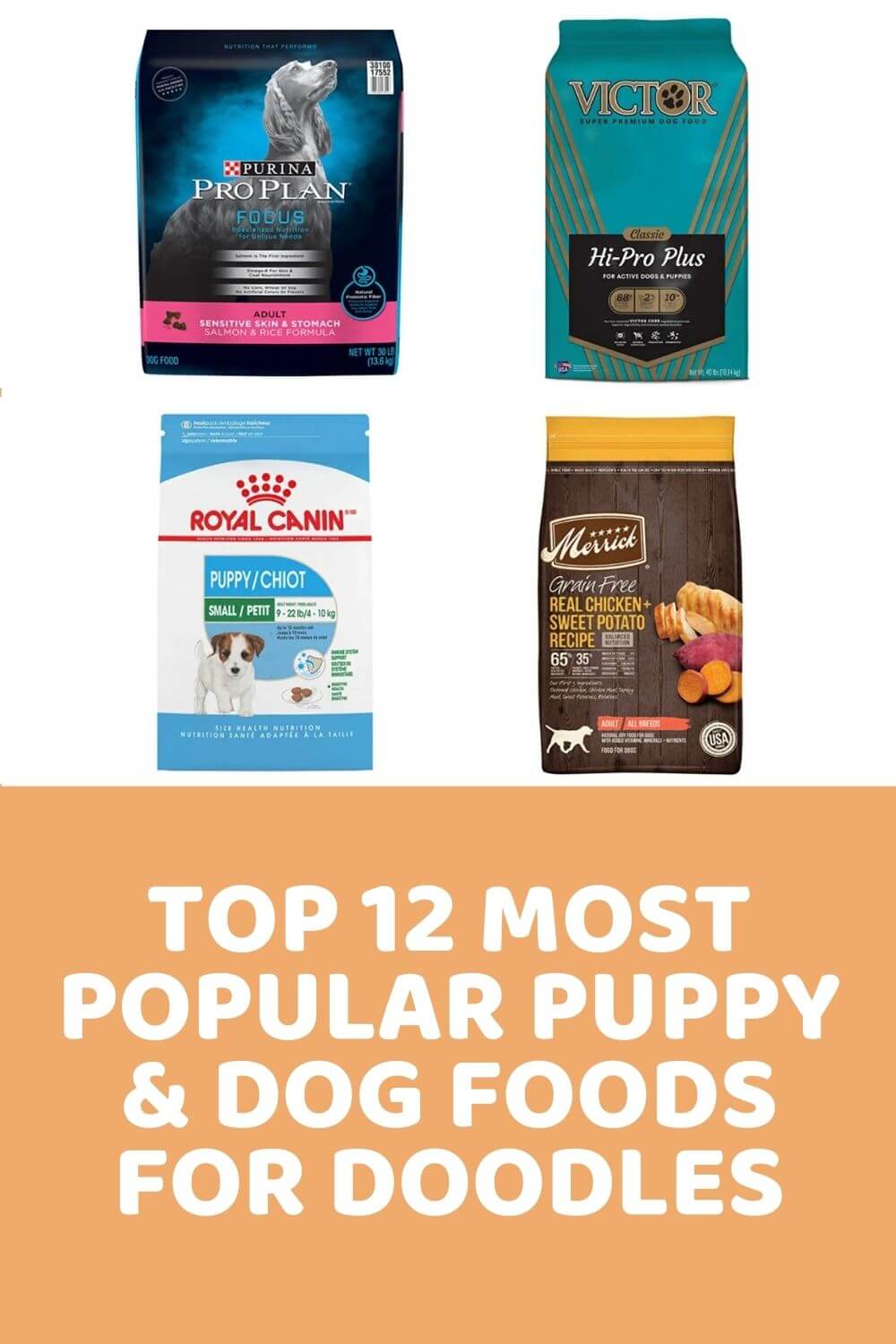In this article, we will take a look at what exactly should be in your dog’s diet. We will also provide some recommendations of the most popular options of best dog food for Sheepadoodles. These foods offer high-quality nutrition without breaking the bank.
Sheepadoodle Nutritional Needs: A Quick Overview
Picking the perfect food for your pooch can be more complicated than it initially seems. The great thing is you have a ton of options to choose from (although that can sometimes make things worse rather than better!). Furthermore, not all foods are created equal.
Whether you opt for wet food or kibble, generally speaking, the cheaper it is, the worse the nutritional profile. Your dog may not actually be getting everything you need from what you are feeding them. So how do you know what to look for? Is wet food best? Should I be feeding my dog a raw meat diet? Are all grains harmful?
Let’s break it down.
First off, many owners believe that dogs are carnivores and only require meat. That’s not strictly true. While high-quality protein is undoubtedly a fundamental, irreplaceable part of their diet, canines also benefit from other types of food in much the same way we do. That’s why you might catch your pup sometimes grabbing mouthfuls of grass.
While many pet parents think dogs eat grass to help induce vomiting when they have an upset stomach, experts believe it could indicate a nutritional imbalance. That being said, it could simply be a leftover evolutionary behavior from their wolf days. They might just like the taste and texture of it.
Common Sheepadoodle Health Issues and How Food Can Help
Doodles as mixed dogs are generally pretty healthy – especially compared to their pedigree counterparts. Genetic conditions that attach themselves to specific breeds are less likely to develop in these lucky pups. However, that doesn’t make them completely immune to all illnesses.
Sheepadoodles are prone to the same conditions that their parent dogs (the Old English Sheepdog and the Poodle) – just not quite as much so. These include:
Sensitive Stomach
Food intolerances are more common than you would think in dogs. Some dogs even go on to develop issues with ingredients despite eating them their entire lives. Luckily there are plenty of products on the market designed for just this issue. These tend to have fewer ingredients known to be problematic, such as fillers, chemicals, and poultry products.
Allergies
Tending to come from the Poodle side of the Doodle equation, allergies have much the same symptoms as intolerances (digestive issues) but are perhaps a little more severe. These can also manifest as other problems such as excessive biting, scratchy and dry, scaly skin. If you suspect your pup has a food allergy, the best thing to do is speak to your vet.
Joint Problems
As medium-to-large dogs (in most cases), Sheepadoodles can suffer from elbow and hip pain – especially as they age. While there is no way to counteract this type of wear and tear, certain food ingredients, such as omega oils, glucosamine, and chondroitin sulfate, have been shown to significantly reduce discomfort. For this reason, they are often added to senior food mixes.
Gas/Bloat
Gas and bloating can also be an issue for Sheepadoodles – and a serious one at that. While the absolute causes of these aren’t entirely understood, they are linked to intolerances with food as well as eating too much food too quickly. The best way to reduce the chances of your dog suffering from either of these is to feed them little and often and do what you can to slow down a guzzler – slow feeding bowls, etc.
Best Foods for Sheepadoodles: Buyer’s Guide
Probably one of the first things you will need to decide with regards to your pet is whether to feed them wet or dry food. Both have advantages and disadvantages:
Wet Food
If you were to ask your dog, they would likely rate wet food over dry food. This is because it tends to be more flavorful. It also more closely resembles the meat and animal parts they would be consuming in the wild.
However, this kind of food tends to be on the expensive side, and it doesn’t always contain the goodness of kibble. Plus, it can be tougher to keep fresh – not to mention, carry home from the store!
Dry Food
Otherwise known as kibble, dry dog food might not be quite as appealing. Yet, this food tends to offer your pup a more balanced diet with a variety of ingredients contained within each pellet or biscuit. It can also be better tailored to specific sizes and life stages.
Further benefits of kibble include an extended shelf life meaning you can buy in bulk and avoid the hassle of running low. Plus, it tends to be more wallet-friendly than wet food. For all these reasons, our recommendations below are all different types of kibble.
If you have decided to go this way, there are a few more things to think about. Firstly, you need to ensure the formula you opt for is suitable for the dog that you have. In practical terms, you need to pay attention to the size of the kibble. Anything too small could be a choking hazard, and anything too large could be tricky for your pooch to chew.
Beyond that, the nutritional needs of smaller dogs differ from those of larger ones. Generally speaking, teenier pooches need more calorie-dense blends – which sounds a little counterproductive but is true enough. This is to do with the fact that they have a much faster metabolism. Pay attention to the types of breeds the kibble was prepared for (toy, small, medium, large or giant), and you won’t go far wrong.
Avoid selecting food based on brand recognition. While this may work out in your favor (companies are generally more well-known if they are well-liked), you can’t always guarantee that to be the case. Instead, take a look at the top five listed ingredients – that will tell you everything you need to know.
Protein
As covered in the above section, a decent-quality protein is a key part of a canine diet. It should be the predominant foodstuff and the top ingredient of any good dog food, wet or dry. According to the Association of American Feed Control Officials (AAFCO), your pup needs at least 18% of their feed to be animal-based protein to maintain optimal health.
Fats
The next most prolific nutrient for a balanced diet, fat, should constitute 10 to 15% of your pet’s daily diet. This comes as a surprise to many dog owners who might assume that fat is as bad for their pup as it is for us. However, canines run into problems when their fat amounts are too low. Active dogs require fat to fuel their muscles and provide energy, among other things.
Carbohydrates
Lower down the ingredient list; carbohydrates do for dogs much the same as what they do for us. They are a highly digestible, readily-available source of energy. They are also a valuable source of fiber for good dietary health. However, pups don’t require many carbs for a balanced diet, yet some manufacturers stuff their foods full of them because they are cheap – something to watch out for.
Finally, there’s been a lot of recent hype on the benefits of grain vs. grain-free. Mostly vet advice seems to be to include grains in your pup’s diet unless specifically recommended not to. Check out our dedicated article Is Grain-Free Good for Dogs? The Long Debate for more on this.
Best Foods for Sheepadoodles: Reviews
Best for Healthy Hounds
Blue Buffalo foods are firm pet parent favorites, and for good reason. For us, there really is nothing better than their Life Protection Formulas with their all-natural recipes and Super 7 package of antioxidant ingredients for keeping your Sheepadoodle happy and fighting fit all day long.
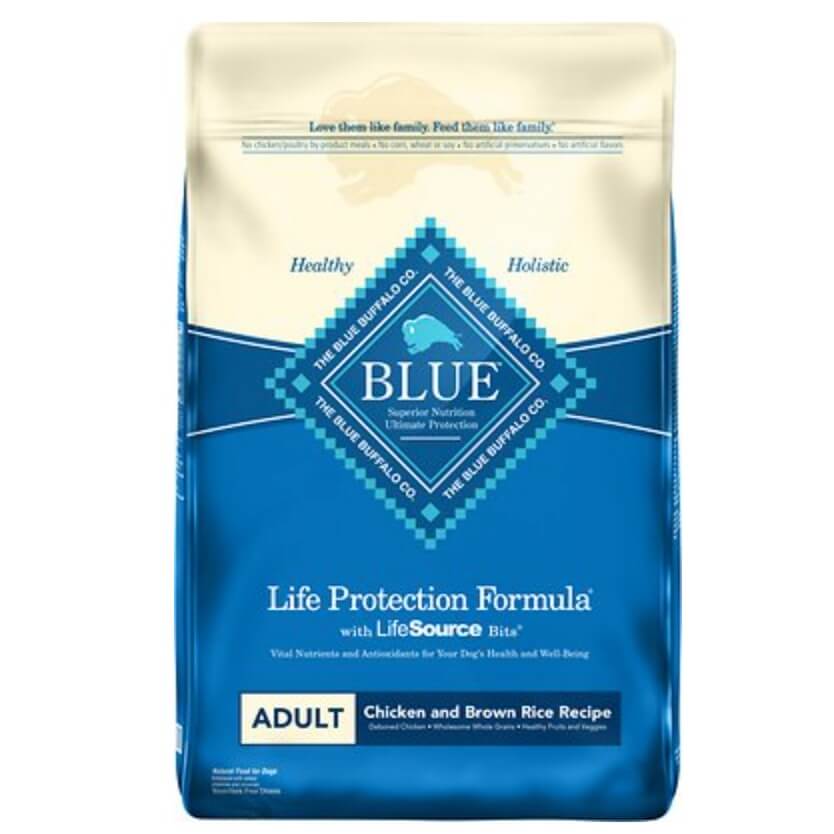
Reviewers seem pretty sold on this brand too. They comment that the food is worth the slightly higher price tag because of the quality of the ingredients it contains. Many also mention that their fussy pooches seem to love it over and above any other types of kibble they had previously tried. Healthy and tasty – you can’t get better than that!
Pros
Simple, nutritious, scrumptious ingredients with absolutely no corn, wheat, or soy, Blue Buffalo is enjoyed by most dogs and is good value for money to boot.
Cons
Chicken, although probably the most popular kibble flavor, is also a common canine allergen. Keep an eye out for signs that your dog is not getting along with this food.
Best for Sensitive Souls
Thousands of five stars don’t lie – Purina is any pet lover’s best friend. Especially because they have such an extensive menu of canine foods and treats. This highly digestible salmon and rice formula is perfect for pups with food allergies and intolerances. The omega oils help with flaky skin and a dry coat too.
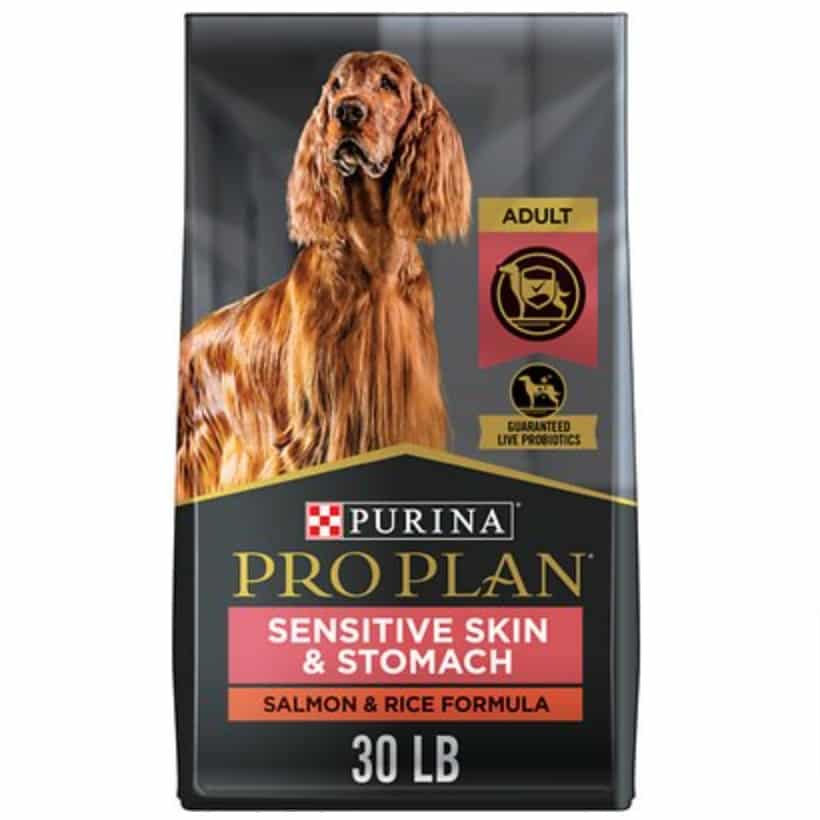
Find the Best Deal:
This food seems to have done the trick for plenty of pals previously plagued by digestive issues. Many owners mention a quick reduction of symptoms from the offset with this yummy blend. It even seems to help with ear issues and some behavioral problems (likely ones caused by bloating and discomfort).
Pros
Purina’s Sensitive Skin and Stomach kibble does just what it says on the tin… err bag. Moreover, dogs enjoy the flavor (perhaps a happy alternative to chicken).
Cons
The fishy smell of the food didn’t sit well with all owners.
Best for Active Chaps
With 88% meat protein, there is no denying that this is top-of-the-line dog food. It’s also nutrient-dense and fortified with crucial vitamins, minerals, essential fatty acids, proteins, and amino acids. This makes it perfect not just for high-performance dogs but also for growing puppies and pregnant and lactating females.
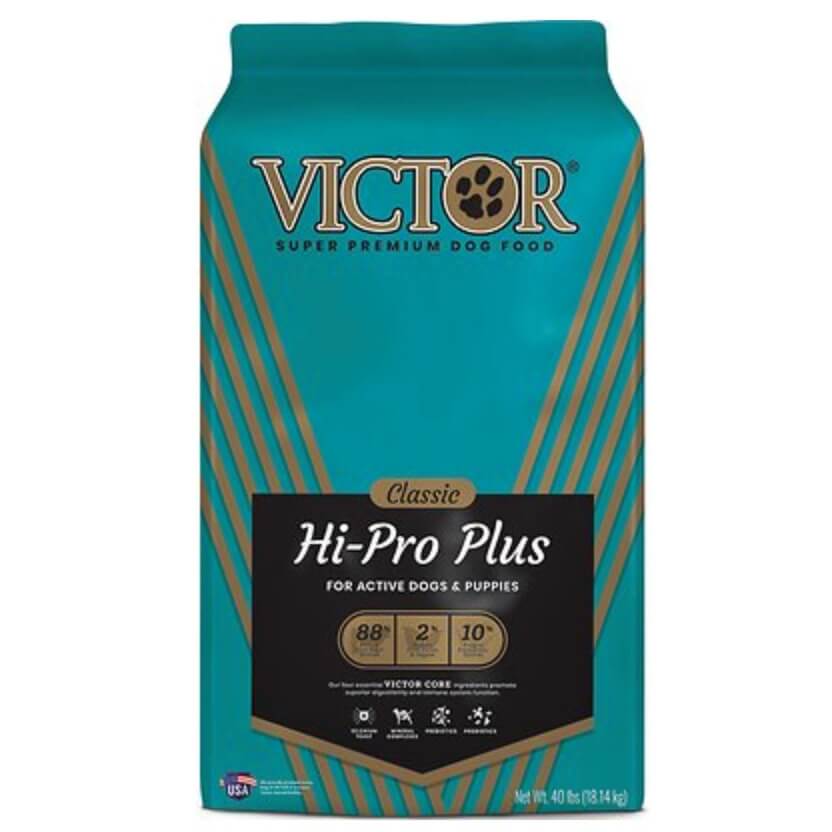
Those who have purchased this food rave about what it has done for their dog. They report more energy, a glossier coat, better digestion, and firmer stool, among other things. It goes down well even with picky eaters and helps relieve issues with digestion caused by other brands. A top choice for your always-on-the-go Sheepie.
Pros
Great dog-suited ingredients that have super effects on health. This food is also quite versatile across different ages and life stages.
Cons
Take care, this food is significantly higher in calories per cup than similar kibbles. You need to watch out for weight gain.
Best for Pudgy Pups
If your pet is a little on the larger size, then you may be looking for ways to help them slim down. This is important because canine obesity (super common in the US) comes with all kinds of health complications. Hill’s Science Diet food, designed by experts and at around half the calories of regular kibble, is perfect for doing just this.
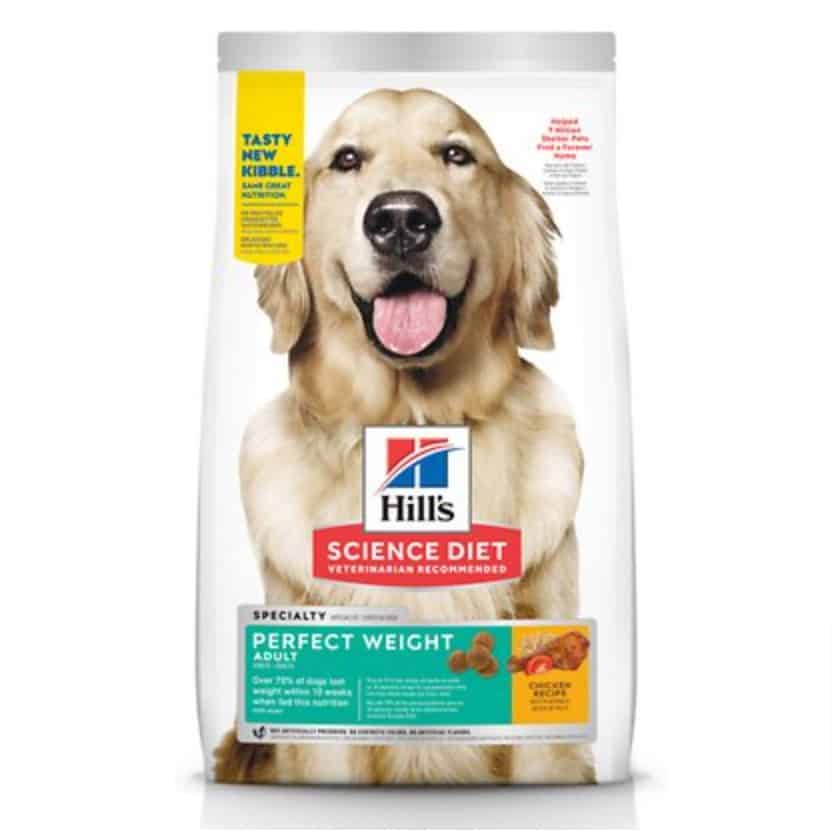
Reviews tend to be pretty good for this food. The majority of pet parents have noticed a difference in their pup’s weight within the first few weeks of switching to this food. Also, unlike other weight management kibbles, dogs do seem to enjoy eating this tasty chicken recipe.
Pros
Quality ingredients combined at the highest standards, Hill’s is a name you can really trust in the pet food world.
Cons
Some owners report that their dogs weren’t keen. If this is the case with you, try adding a healthy topper to get them started.
Best for Older Doods
A new name for us – but it’s looking pretty good. Country Vet has designed this special recipe specifically to support dogs through their golden years. With wholesome chicken meal, prebiotics, and probiotics plus added omega acids, glucosamine, and chondroitin sulfate, this kibble will no doubt reveal the playful puppy in your older best friend.
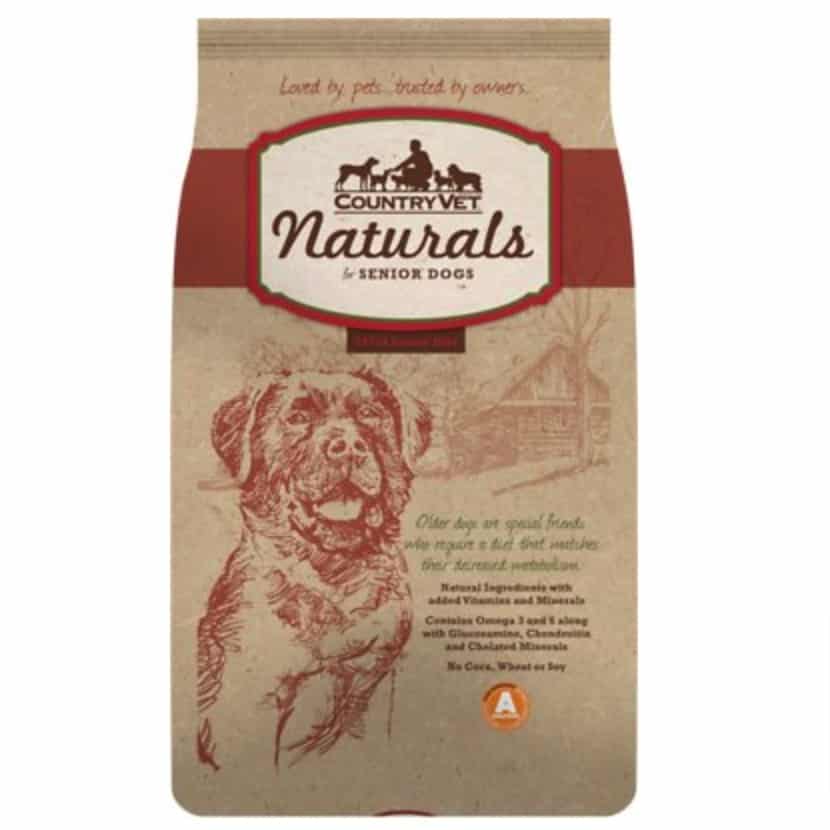
Owners that have switched to this formula seem pleased with the results. The size and texture of the biscuits are suitable for older dogs with slightly weaker teeth, plus it’s easy on sensitive stomachs. Many comment that they love the natural, limited ingredients of the recipe and will be sticking with it for the foreseeable future.
Pros
Country Vet has really considered just what an aging pooch needs with this food – everything from the ingredients to the pellets.
Cons
While this food is lower in fat than other types, it’s still relatively high in calories. If your pup is slowing down a bit, you may need to reduce the amount you are feeding them.
Best for Working Mutts
Formulated for sporting, hunting, and working hounds, Inukshuk’s Dry Food provides high-level nutrition for those that really need it. Not only can this excellent blend fuel sustained activity, but added prebiotics and chelated minerals promote a healthy gut and immune system. At the same time, DHA and other omega-3 fatty acids boost skin, coat, and joint health.
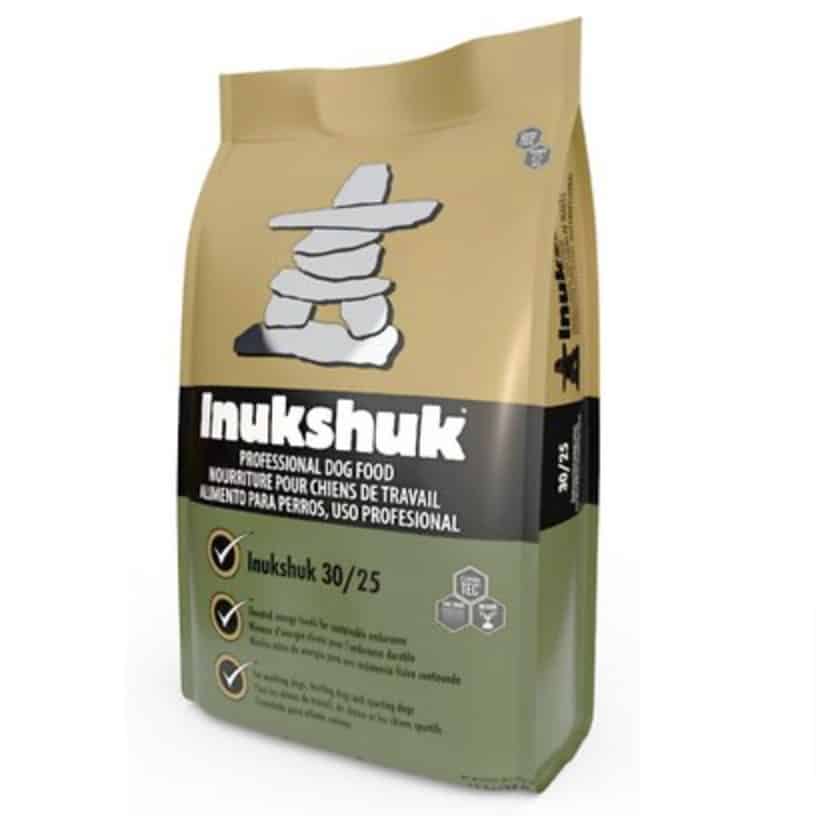
This food is certainly not for every pet, but it is truly perfect for hard-working dogs. This is something clearly reflected in the limited but mostly positive reviews. Owners who have had issues keeping the weight on their hyper pups have had great success with this quality kibble.
Pros
The dense, concentrated formula means less feeding (and subsequent cleanup). Yet, it is still packed full of everything athletic dogs.
Cons
Only for dogs who are getting plenty of exercise, growing puppies, and pregnant or lactating mothers. Sedentary or older pups won’t benefit from this food.
Best for Puppies
Tasty and nutritious, Nature’s Recipe Puppy Food is loaded with protein, fiber, plus vitamins and minerals like calcium and zinc that are great for healthy growth and development. And with no added corn, wheat, soy, or artificial flavors, colors, or preservatives, you can be sure that when you feed your puppy this kibble, they are getting only the good stuff.
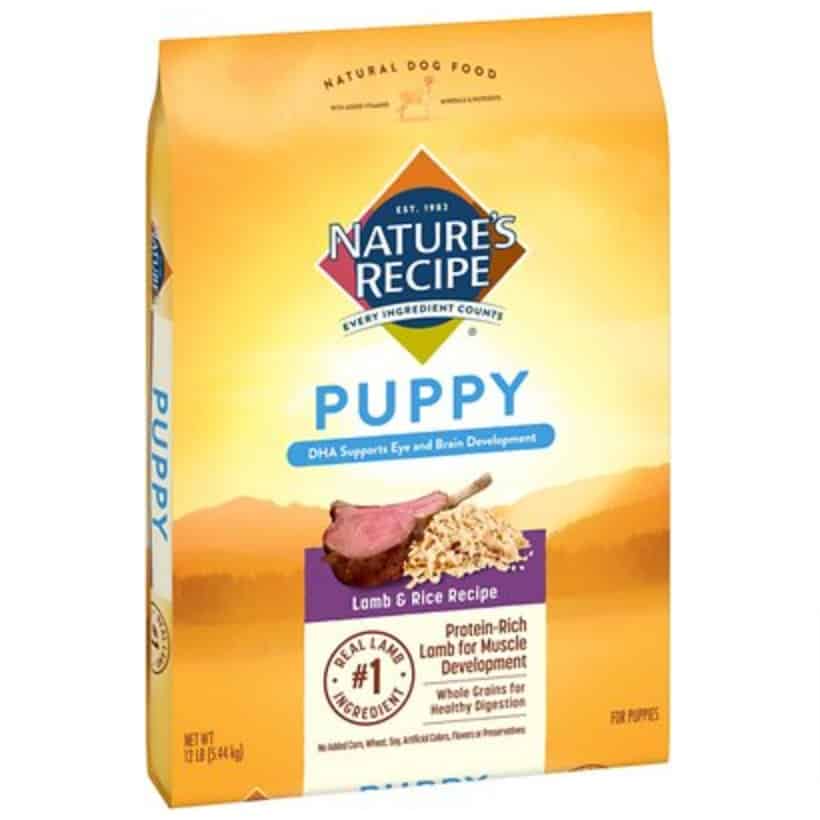
For new puppy parents, this is a great shout. It’s an excellent product, and moreover, most puppies seem to really love the taste. The small bites are perfect for little mouths, and the food is easy to digest. The consensus seems to be that this is a reliable brand with high-quality food at an affordable price.
Pros
The protein and fat content are great for little Doods, plus the additional extras support the very best health of growing dogs.
Cons
Some reviewers thought the pellets were a little tough for smaller breeds. You might need to add a little water if your pal is struggling to chew these.
The Homemade Food Option
If you would like to have a little more control over your dog’s diet, whether because they have many sensitivities or simply you want to give them a little extra care, you may opt to make your own food for them at home.
While this may seem straightforward enough now that you know a little more about the necessary nutrients, it can still be a little tricky unless you are a serious food expert with plenty of time on your hands.
You will need to select a high-quality protein source. Lean cuts and fish are generally best. Then you will need to add a nutritious selection of fruits, vegetables, and healthy grains.
Follow the American Kennel Clubs’ guidance for making your own dog food and look out for expert recipes on the web.
Ingredients to Avoid in Sheepadoodle Food
When purchasing a food, especially one made in the country, you can be pretty certain that all the ingredients are FDA approved. Certainly, they will not contain foods that are known to be toxic to dogs like:
- Onions, garlic, and chives
- Chocolate
- Macadamia nuts
- Avocado
- Grapes and Raisins
Sheepadoodle Feeding Guide
Sheepadoodles tend to be quite active dogs, requiring around an hour a day of dedicated exercise with some games thrown in between for good measure. For this reason, they need a good amount of food. Although the exact portion will vary depending on their size and life stage.
Many owners tend to overfeed their pets. They fall victim to those sad puppy-dog eyes. This can be extremely harmful to their health. Don’t fall into this trap!
For exact details on how much kibble to give your pup, refer to instructions provided on the food packaging or plug your dog’s numbers into our handy feeding calculator.
Sheepadoodle Nutrition: Frequently Asked Questions
Are Sheepadoodles picky eaters?
Sheepadoodles aren’t necessarily picky eaters – especially as puppies. However, this can change as they get a little older and get more of a handle on what they do and don’t like. Like us, dogs can get bored with the same old flavors day in and day out. While it’s not a good idea to shift things around too much, a little variety is bound to be appreciated.
How long should a Sheepadoodle eat puppy food?
Experts typically suggest switching your dog from puppy food to an adult formula when they reach their full size. However, puppy kibble often has higher amounts of fat and usually contains more calories than adult ones. So, if you notice your Sheepie piling on the pounds, then it might be worth swapping over. Just make sure to keep changes gradual so as to not upset your pup’s stomach.
How much food should a Sheepadoodle eat?
The amount you give your Sheepie will depend on their size (especially their weight) and their current life stage. Bigger dogs naturally need more food than their smaller counterparts. Likewise, younger dogs tend to expend more energy than geriatric hounds. However, there can also be individual differences between dogs based on their activity levels, too. Check the manufacturer guidelines first and take it from there.
Can Sheepadoodles eat chicken?
Sheepies generally do fine with chicken. If you are feeding them fresh-cooked chicken, just take care to remove all the bones first. Small bones present a choking hazard for dogs, and larger cooked ones are brittle and can easily break down into smaller sharp pieces. That being said, chicken is a surprisingly common allergen in pups, and reactions to it can even develop later in life. If your dog starts to have problems with their chicken-flavored food, this could well be the issue.
What do you feed a Sheepadoodle?
You want to aim for a good-quality kibble with natural, nutritious ingredients that will support the overall health and wellbeing of your dog. While there are some similarities between pups of the same breed or type, every dog is different. What works for one may not necessarily work for yours. You may need to shop around for a bit before you find the one that suits both of you.
When picking out the right food for your pet, there are a few things to be on the lookout for. You want to ensure that it is nutritionally balanced and meets the needs of your pet’s size, age, and life stage. Here we have included some top picks based on research and reviews. If none of them float your boat, just ensure that whichever brand (and flavor) you opt for that you carefully check the ingredients to ensure that it offers balanced nutrition for your four-legged friend.
Learn How to Care for Your Doodle Puppy!

Perfect for first-time Doodle parents, get ALL your questions answered, including questions new Doodle parents don’t even think to ask.
Plus, get $700 worth of Bonus Materials for FREE, including:- Doodle Parenthood Community and Support Group ($190 value)
- Doodle Puppy Growth Tracker ($20 value)
- EMERGENCY Cheatsheet: When To Call The Vet Immediately ($50 value)
- HELP! Button ($145 value)
- And SO MUCH MORE!
The information on this page is for informational purposes only. It is not intended to be a substitute for qualified professional veterinary advice, diagnosis, or treatment. Always seek the advice of your veterinarian or other qualified animal health provider with any questions you may have.

